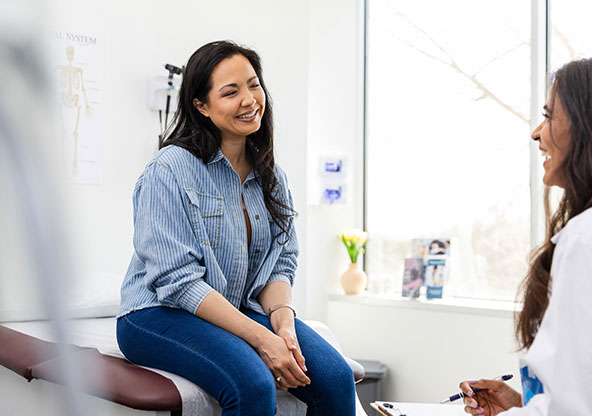Women’s Checkups You Need in Your 30s and 40s

Many women in their 20s are focused on building a career, starting a family, or finding their path in life. By the time you reach your 30s and 40s, you hopefully feel established and ready to make your health a top priority—which is a good thing. At this stage of your life, regular women’s checkups can help you prevent or identify health issues that might appear later in life.
Never Too Young for Women’s Health Checkups
You may think you won’t start having health issues until your 40s, 50s, and later, but health problems can occur at any age. It’s never too early to establish good health habits, including:
- Regular physicals with a primary care provider (PCP) to check your blood pressure and cholesterol; discuss your mental health; review diet, exercise, alcohol consumption, and tobacco use; and make sure you’re up to date on important vaccines
- Regular visits with your OB-GYN for cervical cancer screenings, screenings for sexually transmitted infections, and discussions about starting a family, birth control, and other sexual health concerns you may have
Health Screenings You Need at Age 30
You may not notice significant changes in how you look and feel at age 30, but your body is, nonetheless, changing. For example, your metabolism begins to slow in your 30s, which can lead to weight gain, and you begin to lose muscle mass. Fertility also drops, so it may take longer to get pregnant if you’re looking to start or grow your family.
Beginning at age 30, experts recommend you make these health screenings a priority:
- Blood pressure screenings. Most women need these every three to five years. You should have your blood pressure checked every year if you have elevated blood pressure, are overweight, or have a preexisting health condition, such as diabetes, heart disease, or kidney problems.
- Cholesterol screenings. The U.S. Preventive Services Task Force recommends beginning these at age 45, but you might need one in your 30s (and perhaps earlier) if you have risk factors for heart disease.
- Diabetes screenings. These generally begin at age 35 unless you have risk factors for Type 2 diabetes, such as prediabetes, heart disease, or being overweight.
- Cervical cancer screenings. There are two tests for cervical cancer: Pap tests and human papillomavirus (HPV) tests. Beginning at age 30, you should have a Pap test every three years, an HPV test every five years, or a combination HPV/Pap test every five years.
Many screenings will occur during your annual well-woman exam or physical. In addition to blood pressure, cholesterol, and diabetes screenings, your PCP can address concerns about your mental health and make sure you’re getting any necessary vaccines. Your PCP can also examine your skin for signs of skin cancer or refer you to a dermatologist who can perform a more thorough skin cancer screening.
If you have a family history or other breast cancer risk factors, your PCP or OB-GYN may suggest beginning breast cancer screenings at age 30. Similarly, if you have risk factors for colorectal cancer, also known as colon cancer, your PCP may suggest a colonoscopy.
Health Screenings You Need at Age 40
By age 40, your body is changing more than you may expect. Maintaining a healthy lifestyle and regular preventive care take on new importance.
- Annual physicals should continue so your PCP can check your blood pressure. Based on your risk factors for heart disease, you may begin having cholesterol screenings at age 40 or age 45, and those should continue every five years for women with normal levels.
- Annual well-woman exams are also important, not only to stay on top of reproductive health concerns but also to address perimenopause. On average, women experience menopause at age 51, but it can occur as early as age 40. Perimenopause—the months and years that precede menopause—also usually begins for women in their 40s. Your OB-GYN can help you manage perimenopause symptoms, such as hot flashes, night sweats, changes to your menstrual cycle, and vaginal dryness, which can affect your quality of life.
- Cancer screenings become a higher priority in your 40s.
- Most women should begin having an annual mammogram to screen for breast cancer at age 40.
- Cervical cancer screenings should continue at the same intervals you had during your 30s. Your OB-GYN may say you no longer need one if you have had a total hysterectomy, in which both your cervix and uterus were removed.
- Colorectal cancer screenings should begin at age 45 for women at average risk. Colonoscopies which are considered the gold standard for colorectal cancer screenings, are necessary only once every 10 years. Other screenings, however, are performed more frequently.
Staying Healthy as You Age
All women can benefit from regular medical care throughout their 30s and 40s. In addition to the screenings discussed above, your providers can counsel you on healthy behaviors that will keep you feeling your best in your 30s, 40s and beyond, such as:
- Eating a healthy diet
- Exercising regularly
- Getting sufficient, high-quality sleep
- Managing stress, depression and anxiety
- Quitting tobacco if you smoke
